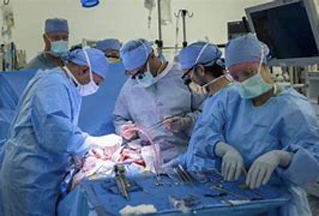SACRAMENTO (TIP): A pair of surgeons at the University of California Health, including Indian American Dr. Inderbir Gill, have performed the first human bladder transplant, introducing a new, potentially life-changing procedure for people with debilitating bladder conditions.
Dr. Gill, the chairman of the urology department at UCLA, successfully completed the surgery with Dr. Nima Nassiri, a urologic transplant surgeon, at Ronald Reagan UCLA Medical Center on May 4, 2025.
Dr. Gill called the historic operation “the realization of a dream” for treating thousands of patients with crippling pelvic pain, inflammation and recurrent infections.
“There is no question: A potential door has been opened for these people that did not exist earlier,” he told the New York Times.
The operation was performed on a 41-year-old man who had lost much of his bladder capacity from treatments for a rare form of bladder cancer. “I was a ticking time bomb,” the patient, Oscar Larrainzar, said during a follow-up appointment with his doctors last week. “But now I have hope.”
“Despite the complexity of the case, everything went according to plan and the surgery was successful,” said Dr. Gill. The patient is doing well, and we are satisfied with his clinical progress to date.”
The doctors plan to perform bladder transplants in four more patients as part of a clinical trial to get a sense of outcomes like bladder capacity and graft complications before pursuing a larger trial to expand its use.
Until now, most patients who undergo a bladder removal have a portion of their intestine repurposed to help them pass urine. Some receive an ileal conduit, which empties urine into a bag outside the abdomen, while others are given a so-called neobladder, or a pouch tucked inside the body that attaches to the urethra and allows patients to urinate more traditionally.
But bowel tissue, riddled with bacteria, is “inherently contaminated,” Dr. Gill said, and introducing it to the “inherently sterile” urinary tract leads to complications in up to 8% of patients, ranging from electrolyte imbalances to a slow reduction in kidney function. The loss of the intestinal segment can also cause new digestive issues.
In late 2020, Dr. Nassiri was in his fourth year of residency at the University of Southern California when he and Dr. Gill sat down in the hospital cafeteria to begin brainstorming approaches, according to the Times.
After Dr. Nassiri began a fellowship on kidney transplantation at UCLA, the two surgeons continued working together across institutions to test both robotic and manual techniques, practicing first on pigs, then human cadavers, and finally, human research donors who no longer had brain activity but maintained a heartbeat.
One of the challenges of transplanting a bladder was the complex vascular infrastructure. The surgeons needed to operate deep inside the pelvis of the donor to capture and preserve a rich supply of blood vessels so the organ could thrive inside the recipient.
“When we’re removing a bladder because of cancer, we basically just cut them. We do it in less than an hour on a near-daily basis,” Dr. Gill said. “For a bladder donation, that is a significantly higher order of technical intensity.”
The surgeons also chose to conjoin the right and left arteries — as well as the right and left veins — while the organ was on ice, so that only two connections were needed in the recipient, rather than four.
When their strategy was perfected in 2023, the two drew up plans for a clinical trial, which eventually would bring the world’s first recipient: Oscar.
Dr. Gill previously served as chairman & professor, department of urology at the Cleveland Clinic, Cleveland, OH, where he was on faculty for 12 years (1997-2009).
His primary academic focus is advanced robotic urologic oncologic surgery for cancers of the kidney, bladder and prostate. More recently, his interest has expanded to focal targeted therapy for prostate cancer. He and his team are now exploring artificial intelligence (AI) applications in urology.
In 2021, under his leadership, USC Urology established the first, foundation-funded, dedicated Urology AI Center in a urology department in the U.S.
Indian American surgeon Dr. Inderbir Gill performs world’s first human bladder transplant

Dr. Inderbir Gill, with a pair of surgeons at the University of California, performed the first human bladder transplant, introducing a new, potentially life-changing procedure for people with debilitating bladder conditions.